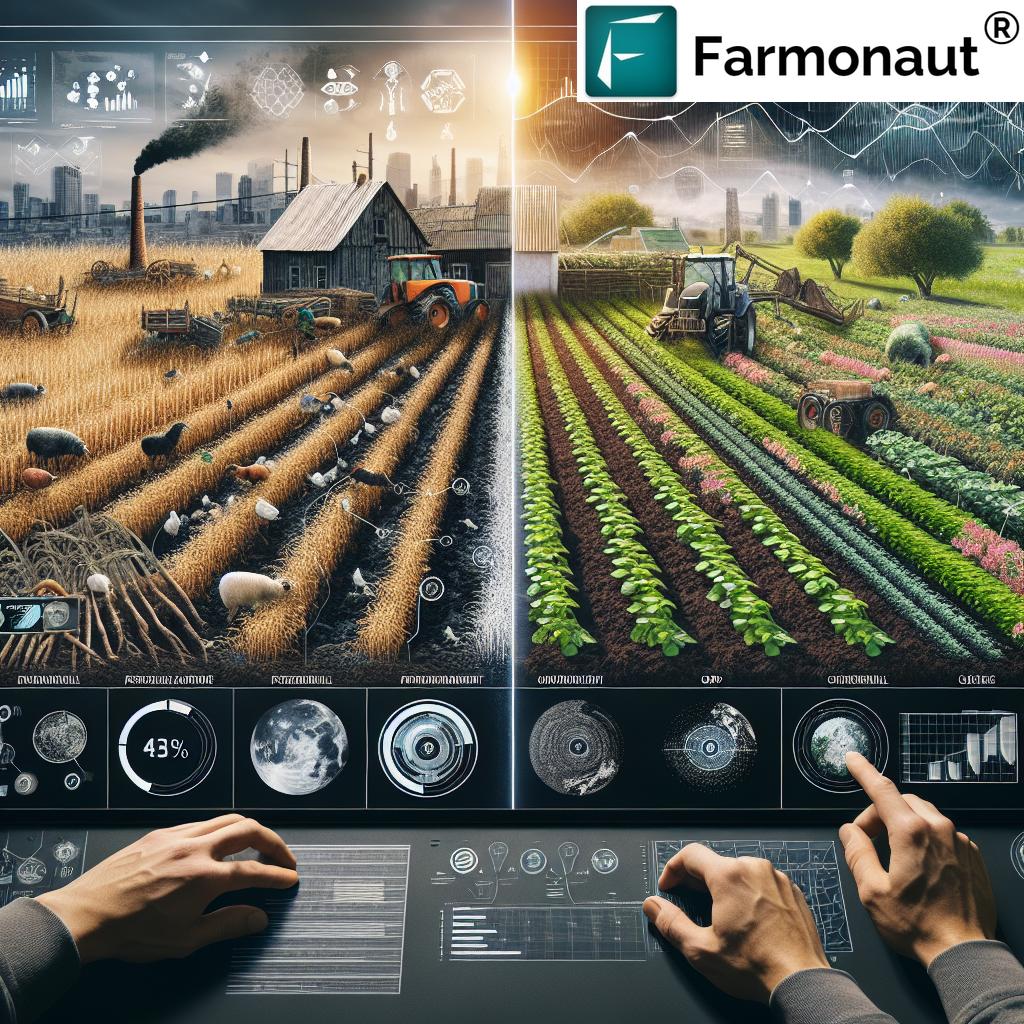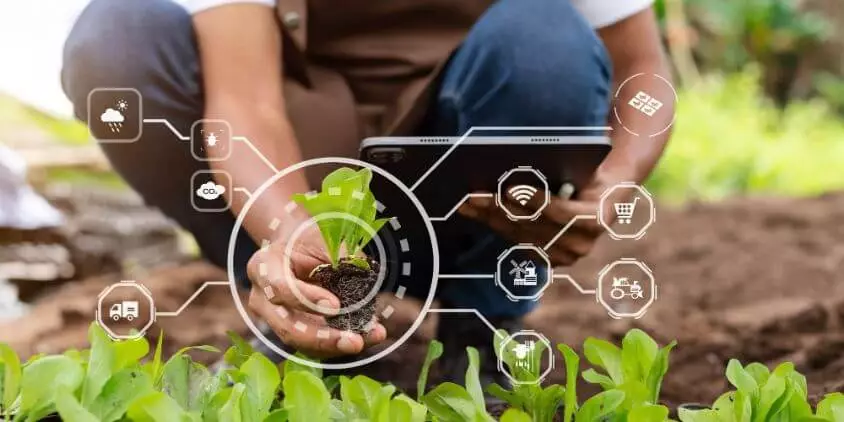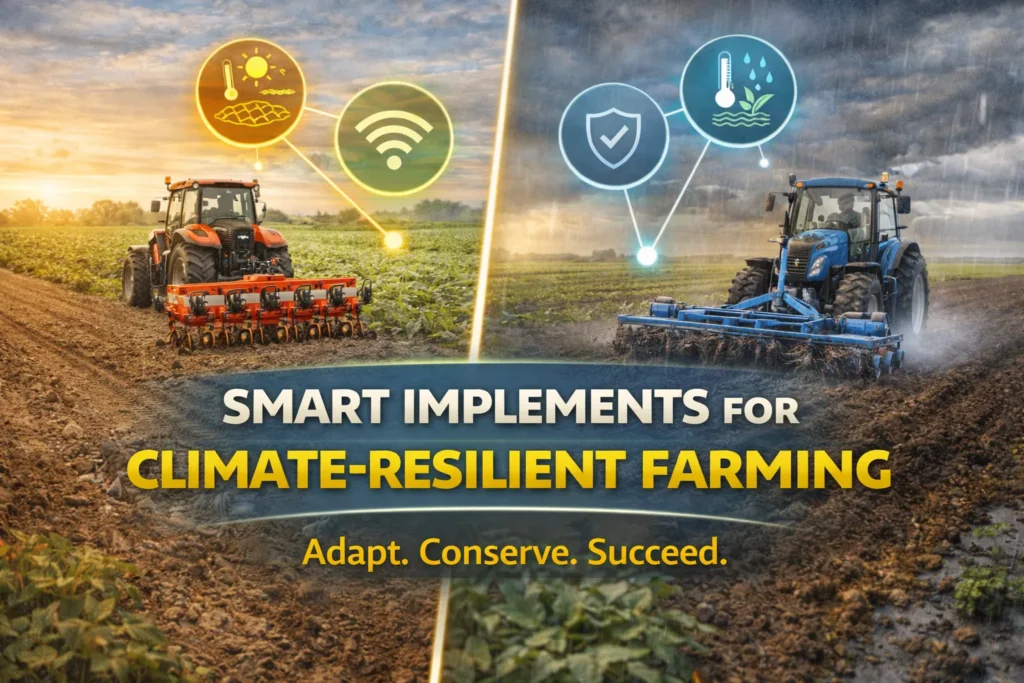Imagine a future where you can shield your crops from the unpredictable tantrums of Mother Nature. A future where your farming tools are not just tools but smart allies in your battle against climate change.
Sounds too good to be true? It’s not. With smart implements for climate-resilient farming, this future is within your reach. These innovative tools are designed to help you adapt and thrive, no matter what the weather throws your way. Intrigued?
Keep reading to discover how you can transform your farming practices and secure a sustainable future for your crops and livelihood.
Climate Challenges In Agriculture
Climate change is reshaping the world of agriculture, presenting new challenges that farmers must overcome to ensure sustainable food production. Rising temperatures, unpredictable weather patterns, and increased frequency of extreme weather events are just a few of the hurdles. How can farmers adapt to these changes while maintaining productivity and profitability?
Farmers worldwide are facing the reality of shifting climate conditions. Droughts are becoming more common, threatening water supply and soil health. You might wonder how to keep your crops thriving without sufficient rainfall. It’s a question many farmers grapple with daily.
Meanwhile, increased rainfall can lead to flooding, which damages crops and erodes valuable topsoil. Imagine waking up to find your fields submerged under water—it’s a nightmare scenario. These extreme shifts make farming unpredictable, demanding new strategies and tools.
Temperature fluctuations also play a significant role in agricultural challenges. Warmer temperatures can accelerate crop growth but may also lead to diseases and pests. Have you noticed new pests in your fields recently? It’s a sign that climate conditions are changing.
Impact On Crop Yields
Changes in climate directly affect crop yields. High temperatures can stress plants, reducing their growth and productivity. You might notice your harvest is smaller than expected. It’s not just you; many farmers face this issue due to heat stress.
Additionally, unpredictable weather can lead to crop failure. An unexpected frost or hailstorm can wipe out an entire season’s efforts. Imagine the frustration of losing your hard-earned crop to a sudden weather change. It’s a challenge that requires innovative solutions.
Adaptation Strategies
Farmers are finding creative ways to adapt to climate challenges. Cover cropping is one effective strategy to protect soil and retain moisture. Have you tried planting cover crops? It’s a simple change that can make a big difference in soil health.
Smart technology is becoming essential in climate-resilient farming. Tools like automated irrigation systems help optimize water use, ensuring your crops get just the right amount of hydration. Are you using any smart implements in your fields? They can be game-changers.
Another approach is diversifying crops to reduce risk. Growing a variety of plants can help buffer against climate impacts. Have you considered adding new crops to your rotation? It’s a practical step to safeguard your yields.
As climate challenges persist, how can you adapt your farming practices to be more resilient? The answer lies in embracing smart implements and innovative strategies. It’s time to explore these options and protect your future harvests.
Innovative Farming Technologies
Smart implements enhance climate-resilient farming by using technology to adapt to weather changes. These tools help farmers manage resources efficiently, reducing waste and increasing productivity. Sustainable practices become easier with these innovations, supporting healthy crop growth despite changing climates.
Innovative farming technologies are transforming the agricultural landscape, offering fresh opportunities to tackle climate challenges head-on. These smart implements are more than just tools—they’re game-changers in the quest for sustainable agriculture. By embracing these advancements, you can enhance productivity while safeguarding our planet’s future.
Understanding Precision Agriculture
Precision agriculture is a farming management concept based on observing and responding to inter and intra-field variability in crops. It involves the use of technology to ensure crops and soil receive exactly what they need for optimum health and productivity. Imagine using sensors to measure soil moisture and nutrient levels, allowing you to add water and fertilizers only where needed. This not only saves resources but also minimizes environmental impact.
The Role Of Drones In Monitoring Crops
Drones are rapidly becoming essential tools for modern farmers. Equipped with high-resolution cameras and various sensors, they provide real-time data on crop health, growth patterns, and potential issues. Picture yourself walking less in vast fields because drones give you detailed insights from above. By flying over your fields, drones can help you identify areas suffering from water stress or pest infestations, enabling timely interventions.
Iot And Smart Irrigation Systems
The Internet of Things (IoT) is making waves in agriculture, particularly in irrigation. Smart irrigation systems use IoT technology to monitor weather conditions, soil moisture, and plant water needs. Imagine a system that automatically adjusts water delivery based on current conditions, optimizing water use and reducing waste. These systems can be controlled from your smartphone, providing convenience and efficiency. How much water could you save with such a precise system?
Ai-powered Pest And Disease Control
Artificial Intelligence (AI) is revolutionizing pest and disease control in farming. Advanced algorithms can predict pest outbreaks by analyzing data from various sources, allowing you to act before infestations occur. Imagine AI alerting you to potential threats, enabling you to implement targeted interventions. This proactive approach reduces the need for chemical pesticides, promoting a healthier environment.
Renewable Energy Solutions For Farm Equipment
Renewable energy is now powering farm equipment, reducing reliance on fossil fuels. Solar panels and wind turbines can be used to power tractors, irrigation systems, and more. Picture your farm running on clean energy, significantly cutting your carbon footprint. What impact would this have not only on your bottom line but also on the environment?
Robotics In Harvesting
Robotic technology is increasingly being used in harvesting, offering precision and efficiency. Robots can work tirelessly, picking fruits and vegetables with care, ensuring minimal damage. Imagine a robot operating alongside you, tirelessly assisting with labor-intensive tasks. This not only boosts productivity but also addresses labor shortages.
By integrating these innovative farming technologies into your practices, you can enhance your farm’s resilience to climate changes. What new technology will you adopt to ensure your farm thrives in a changing climate? The future of farming is in your hands.
Benefits Of Smart Implements
Smart implements enhance climate-resilient farming by optimizing water usage and reducing soil erosion. These tools improve crop yield through precise planting and nutrient management. Farmers can adapt to changing weather patterns, ensuring sustainable agriculture practices.
Smart implements are transforming the way we approach farming, especially in the face of climate change. These innovative tools offer a range of benefits that can make your farming practices more efficient and sustainable. Imagine having the power to optimize your resources, reduce waste, and increase your yield—all while contributing to a healthier planet.
Improved Resource Efficiency
Smart implements help you use water, fertilizers, and other resources more efficiently. Sensors can monitor soil moisture and nutrient levels in real-time, allowing you to add just the right amount of water or fertilizer. This not only saves resources but also reduces costs.
Increased Crop Yields
With precise monitoring and data-driven decisions, smart implements can lead to higher yields. Imagine knowing exactly when and where to plant for the best results. These tools provide insights that can help you make informed choices, leading to more productive harvests.
Reduced Environmental Impact
By using resources more efficiently, you’re also reducing your environmental footprint. Smart implements allow you to minimize runoff and soil erosion. This means less pollution and healthier ecosystems surrounding your farm.
Cost Savings
Although smart implements may require an initial investment, the long-term savings are substantial. Reduced resource use and increased efficiency translate to lower costs. Think about how much you could save by cutting down on water and fertilizer bills.
Enhanced Data Collection And Analysis
Data is power in modern farming. Smart implements collect valuable information about your crops and soil conditions. This data helps you make better decisions and adapt to changing conditions. Are you leveraging the full potential of data in your farming practices?
Adaptability To Climate Change
Smart implements prepare you for unpredictable weather patterns. By adjusting to climate conditions in real-time, you can protect your crops from potential damage. This adaptability is crucial in ensuring the resilience of your farm against climate challenges.
Incorporating smart implements into your farming routine is a step toward more sustainable and profitable agriculture. These tools not only enhance your productivity but also align with a global need for environmentally conscious practices. Are you ready to embrace the future of farming?

Future Of Climate-resilient Farming
The future of climate-resilient farming looks promising. Farmers need to adapt to changing climates. Smart implements play a key role in this adaptation. They offer solutions to unpredictable weather patterns. These tools help conserve resources like water and soil. They also ensure sustainable crop production. The focus is on efficiency and adaptability. Let’s explore how smart implements can transform farming.
Data-driven Decision Making
Farmers can now use data for better decisions. Sensors collect real-time information from fields. This data includes soil moisture and temperature. Analyzing this helps in planning irrigation schedules. It also aids in predicting crop yields. Data-driven decisions lead to smarter farming practices.
Precision Agriculture Techniques
Precision agriculture involves targeted farming practices. It uses GPS technology and drones. Farmers apply inputs like water and fertilizers precisely. This reduces wastage and increases efficiency. Precision techniques enhance crop quality and yield.
Automated Machinery And Robotics
Robotics in farming is on the rise. Automated machinery helps reduce labor costs. Robots can plant, water, and harvest crops. This technology ensures timely field operations. It also minimizes human error in farming tasks.
Climate-resilient Crop Varieties
Developing climate-resilient crops is crucial. These varieties withstand extreme weather conditions. They are resistant to droughts and floods. Breeding such crops ensures food security. Farmers can rely on these crops during adverse climates.
Renewable Energy Solutions
Renewable energy is vital for sustainable farming. Solar panels and wind turbines power farm equipment. This reduces dependency on fossil fuels. Renewable solutions lower carbon footprints. They promote eco-friendly farming practices.

Conclusion
Smart implements enhance climate-resilient farming. They provide tools for change. Farmers can adapt to unpredictable weather. Efficient water use becomes possible. Soil health improves with smart techniques. Crop yield increases. These tools support sustainable farming practices. Farmers gain insights through data.
Decision-making improves. Communities benefit from these advancements. Smart implements make farming more resilient. They prepare farmers for future challenges. Sustainable agriculture becomes achievable with these tools. Investing in smart farming ensures food security. It safeguards our planet for future generations.



